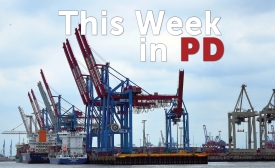trade

Featuring a Japanese-Indian regional initiative and a German-African economic development program.
As the UK prepares to leave the EU, it has a huge number of considerations to ensure its economy prospers. One, which is perhaps overlooked, is Britain’s language policy and how important this is as an economic resource. A strategic language policy and the cultivation of language experts in post-Brexit Britain are essential if it wants to connect with fresh markets overseas. This has long been a feature of international diplomacy—stretching back long before globalization as we know it.
Brexit finally gets underway this week. So now is the time for the United Kingdom to make equal haste with rejuvenating its diplomatic and trade ties in the world, beginning with Turkey. For years the potential of the UK’s ties with Turkey has been smothered by the sweaty, asphyxiating blanket of the EU’s accession talks with Ankara. No one in their right mind, on either side of the Bosphorus, believed in earnest that Turkey would join the EU in their lifetime.
This week, prime minister Hailemariam Dessalegn had presented a six-month performance assessment report of his government to the House of Peoples Representatives. Foreign relation and diplomacy were among the overarching themes. [...] Efforts were channelled towards helping the country enjoy finance either in a form of loan or aid for trade, investment, tourism. In general, the activities were focused on economic diplomacy.
Considering Africa’s lackluster performance, it is no coincidence that many African countries and global development institutions are now prioritizing a strategy of trade over aid. But what if focusing on trade—such as partnerships with Chinese and American governments and companies—is the wrong way to look at the problem? What if instead, African countries focused on innovation? The opportunities for growth and prosperity would be much brighter.
Saudi King Salman’s four-day state visit to Malaysia in late February culminated with an investment deal between Malaysia’s Petronas and Saudi Aramco, as well as key bilateral agreements on the cooperation and exchange of expertise in the fields of trade and economy; labour and human resources; science and higher education; and news exchange. The latter agreements underscore a shift from past engagements.
“The basic strategy and premise of the Container Artist Residency is using existing economic infrastructure as an infrastructure for cultural exchange,” the project’s website says. “Container Artist Residency identifies the shipping industry as a driving cultural and economic force in the contemporary world, and encourages artists to rethink their practice from this unique perspective.”
State-to-state relationships are not grounded in emotions, but based on shared interests. No one is a friend or a foe forever; the convergence or divergence of mutual interests decides the nature of the relationship between two countries. Though relations between Russia and Pakistan remained turbulent over the years, they have been warming up over the last decade, with top political and diplomatic meetings.







